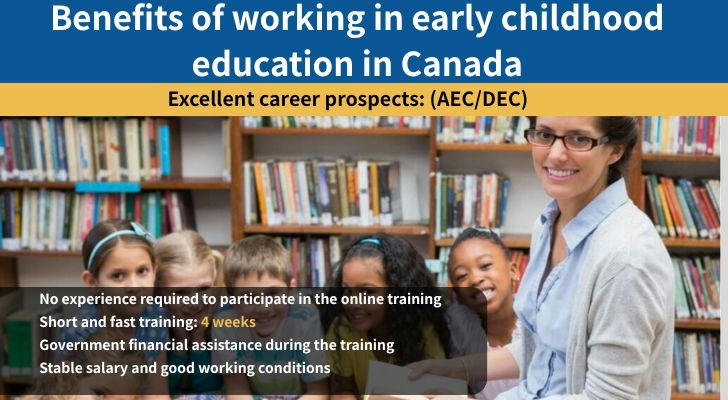Online Early Childhood Education: No Experience Required, Financial Support Offered, Accessible to All
Early Childhood Training Without Experience: Online Courses with Financial Support Available for Everyone

I. The Early Childhood Sector in Canada
The early childhood sector in Canada is growing steadily because more families need quality childcare. Daycares and early learning centers need motivated staff. This creates good job opportunities for people looking for stable work.
II. Why Choose Early Childhood?
Early childhood is a sector that allows active participation in the awakening, autonomy, and well-being of children. It is a meaningful profession that is attracting more and more adults undergoing professional retraining.
Employment prospects in this field are particularly favorable, especially in CPEs and private daycares. Even without prior experience, employers appreciate candidates who have completed training adapted to early childhood, as it certifies essential knowledge and a willingness to commit to this sector.
III. Fast and Suitable Training Without Experience
For people without a diploma or experience in this field, suitable training programs exist that allow quick integration into the job market. These training courses are generally short, lasting about four weeks, totaling nearly 90 hours of learning.
The modules cover the basics of early childhood education, health and safety rules in childcare settings, intervention techniques adapted to children's needs, as well as an introduction to first aid and cardiopulmonary resuscitation (CPR).
This format allows one to quickly acquire the necessary skills to hold positions as an assistant educator or unqualified educator.
IV. Possible Financial Support During Training
During the training period, you could be referred by an employment agent from Service Québec and receive an allowance of $475 per week to follow this training, depending on your qualifications.
Eligibility conditions and the procedures to access this support are available from local employment services, which assist candidates in their training projects.
V. Employment Prospects After Training
Upon completion of the training, participants can apply for jobs as assistant educators or unqualified educators in various settings: CPEs, private daycares, drop-in daycares, or school-based childcare services.
These positions offer an excellent opportunity to gain practical experience, which can then open the way to longer and diploma-awarding training programs, such as the AEC (Attestation of Collegial Studies) or DEC (Diploma of Collegial Studies) in early childhood education techniques.
The daily routine in these jobs includes preparing educational activities, supervising children's safety, and supporting routines such as meals, playtime, or naps, always in a spirit of kindness.
VI. Open to Adults in Career Change
This pathway is particularly aimed at adults seeking a professional change. Whether they come from another sector or have taken a break in their career for family reasons, no prior experience is required.
Candidates must simply show a genuine interest in the development and well-being of children. A level of education equivalent to secondary school completion (Grade 9) is generally required to access the training.
This path represents a concrete opportunity to enter a sector where human qualities such as patience, listening, and creativity are especially valued.
VII. Salary in the Early Childhood Sector in Canada
Working in early childhood in Canada allows earning a stable and attractive salary, even without experience.
- An assistant educator generally earns between $15 and $20 per hour.
- With further training, such as an AEC or DEC, the salary can rise to $28 per hour.
- Public centers (CPEs) often offer better salaries and benefits than private daycares.
- In addition to salary, there are often paid leave and insurance benefits.
- With experience, one can advance to better-paid positions such as specialized educator or service manager.
This sector therefore offers good salary opportunities for those who want to start a new career quickly.
VIII. How to Get Started?
To start, it is recommended to inquire with training centers and local adult education resources in Quebec. These organizations offer programs specially designed for beginners, adapted to the needs of people without experience.
Following a short program allows validating one's interest in this sector while developing the skills necessary for a first professional experience. It is an essential step to build a stable and rewarding career working with children.
For those who wish to receive financial support, local employment services can guide towards available aid and eligibility conditions.
